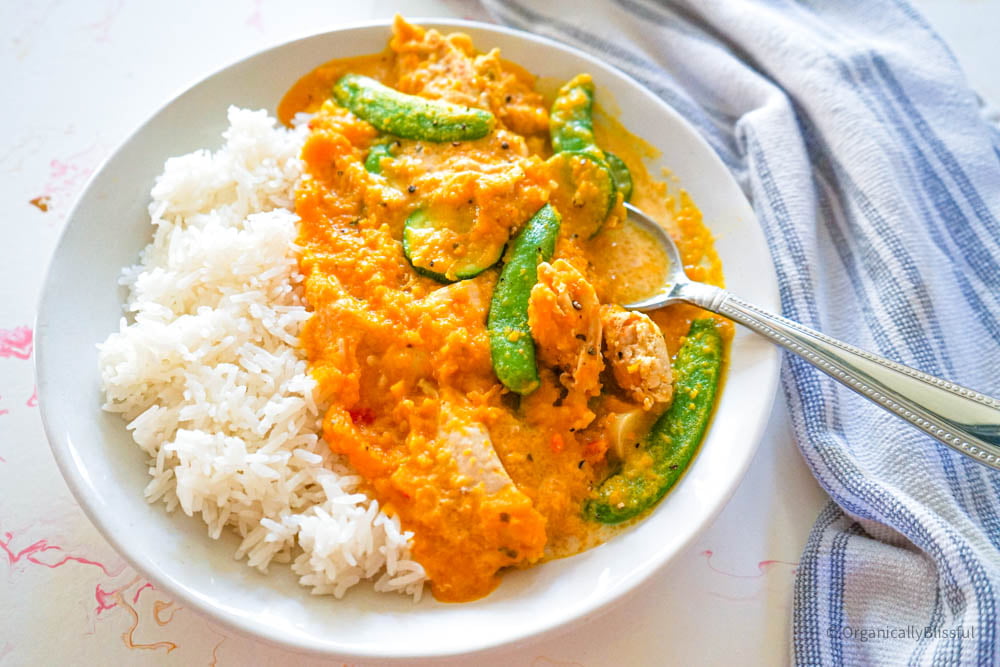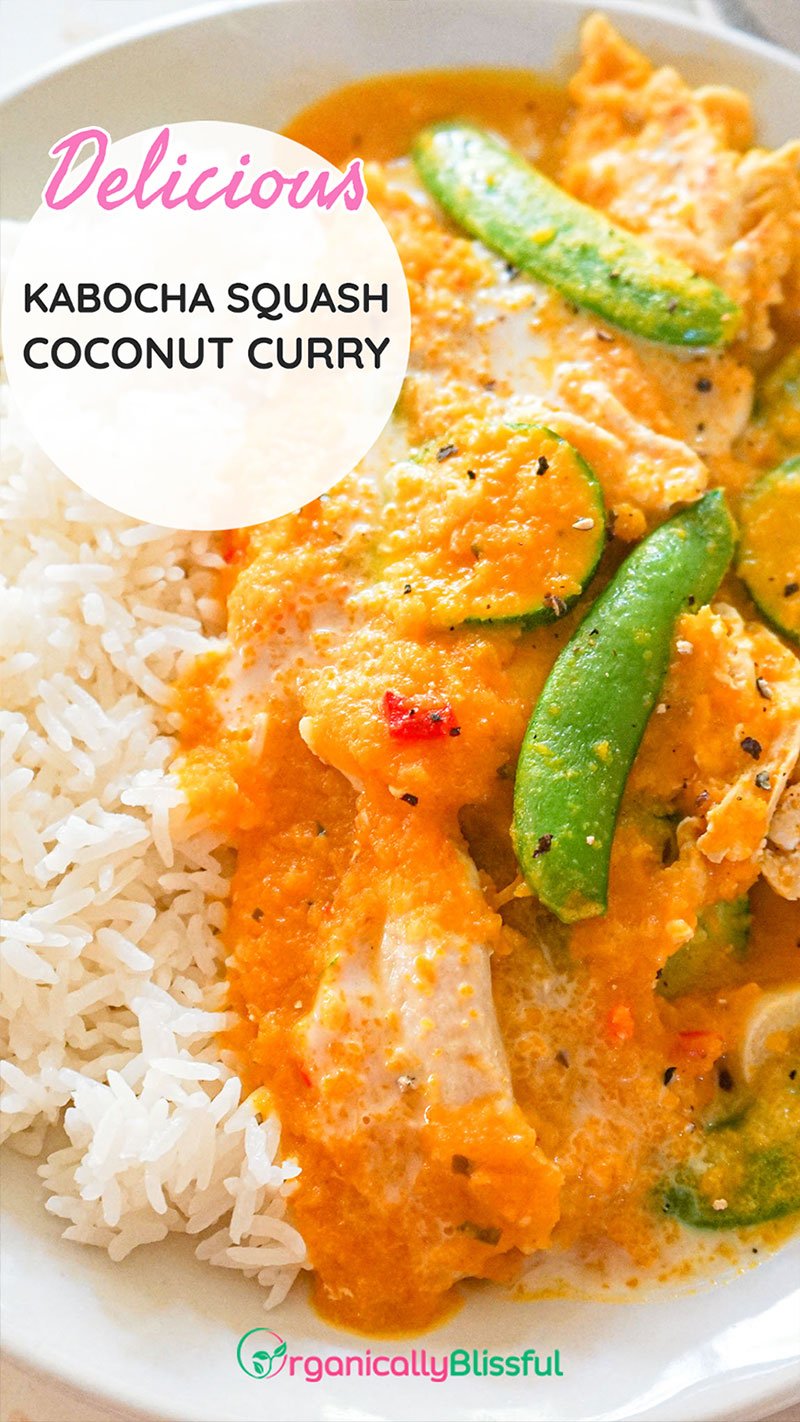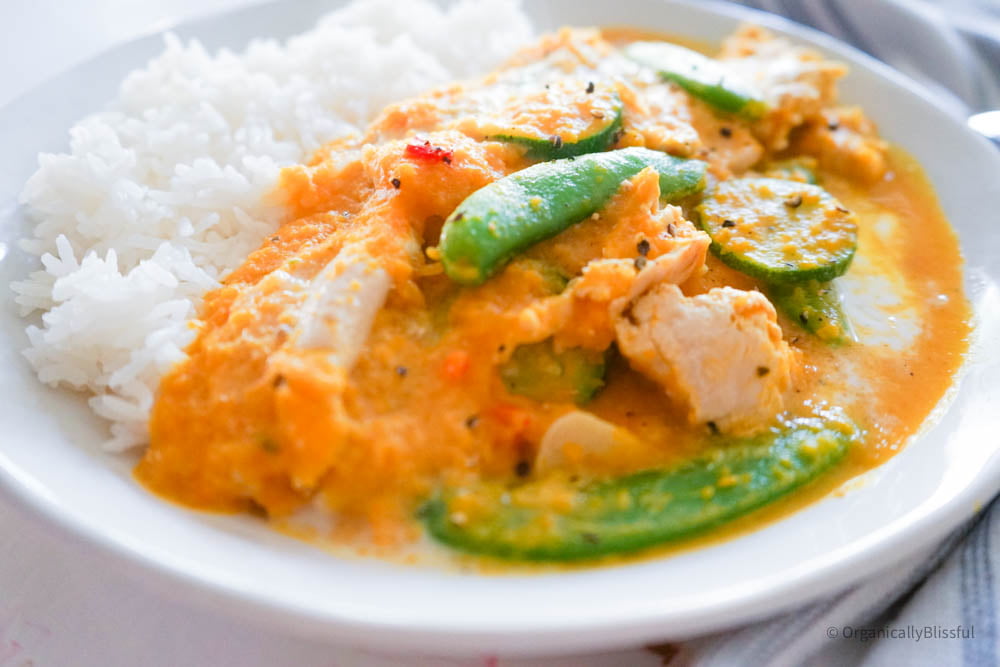Craving something warm and flavorful to combat those chilly days? Look no further than Kabocha Squash Coconut Curry! This delicious and creamy kabocha squash curry features tender chicken, aromatic spices, and the star of the show - kabocha squash, also known as Japanese pumpkin. The velvety texture and natural sweetness of the squash perfectly complement the savory and spicy flavors of the curry. Not only is this dish indulgent and satisfying but it's also packed with nutrients and health benefits.
In this post, I will share how to make a creamy and delicious kabocha squash curry recipe.
Kabocha Squash Coconut Curry Recipe
Prep Time
5 minutes
Cook Time
1 hour
Rest Time
10 minutes
Total Time
1 hour and 15 minutes
Ingredients
Directions
1. Cut kabocha squash into halves or quarters and scoop out the seeds. You can save the kabocha seeds for roasting as a snack later. From there, you can cut kabocha squash into smaller pieces to make cooking kabocha squash easier.
2. Arrange the unpeeled squash pieces with the flesh facing up in a pan. Drizzle avocado oil on the flesh and roast in the oven at 400F for about 20-30 minutes or until soft. Check for doneness by piercing the flesh with a fork. If it goes in easily, it's fully cooked.
3. Let the roasted kabocha squash cool down on a cooling rack.
4. Once cooled, peel the kabocha squash or scoop out the flesh with a spoon. Place the flesh in along with onion, peppers, ginger, and coconut milk. Blend until smooth.
5. In a medium/large saucepan, heat avocado oil with sliced garlic over medium heat. Add the chicken once the garlic starts to burn lightly brown and the oil is infused with garlic flavor. Season it with salt, pepper, and paprika.
6. Stir fry the chicken with garlic for about 5 minutes on medium heat, then add the blended kabocha squash sauce.
7. Mix the chicken and sauce together and add sliced zucchini and bell peppers. Let it cook for 10-15 minutes, or until the zucchini is soft, and then add sugar snap peas.
8. Cook until desired tenderness is achieved. Serve and enjoy!

Tips & Notes
Blend well: I used a Vitamix to blend all the ingredients together, but you can use other blenders or immersion blenders instead. Where to Find Kabocha Squash: Kabocha squash can be found at almost any grocery store. Some markets you can find include Whole Foods and Trader Joe's. Even though kabocha squash is a winter squash, it can be found pretty much all year round.Roast the Seeds: Don't throw away the kabocha squash seeds. Roast them like roasted pumpkin seeds.
Nutritional Facts
Nutrition Facts
Servings: 4
Calories
329
% Daily Value*
Total Fat 25.4g
33%
Saturated Fat 15.1g
75%
Cholesterol 27mg
9%
Sodium 39mg
2%
Total Carbohydrate 15.6g
6%
Dietary Fiber 6.7g
24%
Total Sugars 6.2g
Protein 13.8g
Vitamin D 0mcg
0%
Calcium 44mg
3%
Iron 2mg
12%
Potassium 727mg
15%
*The % Daily Value (DV) tells you how much a nutrient in a food serving contributes to a daily diet. 2,000 calorie a day is used for general nutrition advice.

What You Will Need To Make Kabocha Squash Coconut Curry
Kabocha Squash
Kabocha squash, or Japanese pumpkin, is a winter squash that deserves a spot on your dinner table. Not only is it sweet and rich in flavor, but it also packs a powerful nutritional punch. This versatile squash can be used in a variety of dishes, but one of our favorites is Kabocha Squash Coconut Curry.
If you haven't tried kabocha squash yet, don't worry - you can find this delightful winter squash at any grocery store. Once you do, get ready to be enchanted by its sweet, rich texture and flavor. With its vibrant orange flesh, kabocha squash has a fluffy, velvety texture and a sweetness reminiscent of a cross between sweet potato, acorn squash, and a pumpkin. If you're a fan of butternut squash, you'll be delighted to know that kabocha squash is even sweeter than its more well-known cousin.
Kabocha squash is a powerhouse of nutrients that you'll definitely want to include in your winter diet. It's loaded with beta carotene, an essential nutrient that supports immune health, hair, skin, and eye health. In addition to that, kabocha squash is also a great source of iron, Vitamin C, some B vitamins, and fiber. Another reason to love kabocha squash is that it's lower in calories and carbs than other squash types. With only 40 calories per cup and fewer carbs than most squash varieties, kabocha is a perfect addition to any healthy meal plan.
For this recipe, you can roast fresh kabocha squash or use any leftover roasted kabocha squash you may have. Following my roasted kabocha squash recipe below, if you are using fresh kabocha squash.
Chicken Breast
Adding chicken breast to your coconut curry not only enhances its flavor but also provides a variety of health benefits. Chicken breast is an excellent source of protein, which is essential for building and repairing tissues in the body. It also contains essential amino acids that help improve muscle strength and support healthy bones.
Chicken breast is also low in fat and calories, making it a great addition to any diet. By adding chicken breast to your coconut curry, you can increase the protein content while keeping the calorie count in check.
In addition to its nutritional benefits, chicken breast also adds a hearty and satisfying texture to the curry. It pairs well with coconut milk's creamy texture and complements the curry's spicy and aromatic flavors.
Coconut Milk
Coconut milk is a creamy and delicious ingredient that is commonly used in coconut curries. Aside from its delectable taste and texture, coconut milk also offers numerous health benefits. One of the key benefits of coconut milk is that it contains healthy fats. These fats, called medium-chain triglycerides (MCTs), are easily metabolized by the body and can provide a quick energy source. Additionally, MCTs may help boost brain function, improve heart health, and even aid in weight loss.
Coconut milk is also a great source of vitamins and minerals, and it contains vitamins C, E, and B and essential minerals like iron, magnesium, and potassium. These nutrients are important for maintaining healthy immune function, strong bones, and overall well-being.
Another potential benefit of coconut milk is that it may help reduce inflammation in the body. Inflammation has been linked to various health issues, including heart disease, arthritis, and even certain cancers. The anti-inflammatory compounds in coconut milk may help reduce inflammation and protect against these health conditions.
Spices
I used ginger, cinnamon, cardamom, and paprika in this coconut curry. Adding these spices to coconut curry can add a warm, spicy, and fragrant flavor to the dish. Ginger is well-known for its anti-inflammatory and digestive benefits, while cinnamon has been shown to have antioxidant and anti-inflammatory properties. Cardamom is also known for its antioxidant properties and can aid in digestion. Adding paprika to coconut curry can add a smoky and slightly sweet flavor to the dish. Together, these spices can provide not only great taste but also numerous health benefits. They complement coconut milk's creamy and slightly sweet taste in the curry and create a harmonious balance of flavors.
Vegetables
To incorporate more greens into your diet, don't hesitate to add your favorite vegetables to this recipe. For example, I added zucchini and sugar snap peas for extra flavor and nutrition.
The Best Kabocha Squash Coconut Curry
Simple Ingredients
I like to keep things simple when it comes to cooking. To make this curry, you only need a handful of ingredients, and you probably already have all these ingredients right in your kitchen.
Fresh Ingredients
When it comes to making curry, I love making my own curry base. While you can purchase store bought curry paste, this recipe is perfect for someone who doesn't have curry paste on hand. You will be building your own curry base with ingredients you already have. But if you do have curry paste on hand, you can use it to develop more flavor.
Creamy & Cozy
Kabocha squash has a fluffy texture; when you blend it, it offers a very nice silky and fluffy texture. If you want to go for the ultimate fluffy texture, use coconut cream instead of coconut milk. Coconut milk is much thinner in texture, like regular milk. In comparison, coconut cream is much richer and thicker, like heavy cream. It also has more fat and protein than coconut milk.
Make It Vegan
If you are looking to cook vegan-friendly kabocha squash coconut curry, it is doable and straightforward with this recipe. Simply choose vegan-friendly protein like tofu, chickpeas, or tempeh.
Like this recipe? Check out my Sweet Potato Coconut Curry recipe.

Frequently Asked Questions (FAQ)
What To Do With Leftovers
Store any leftover curry in an airtight container and refrigerate it for up to three days. When you're ready to savor the delicious curry, simply reheat it on the stove or microwave.
What To Serve With
Rice and coconut curry are the perfect combinations. You can serve it with jasmine rice, brown juice, multi-grain, or even purple rice. If you are looking for rice alternatives, opt-in for quinoa or lentils.
